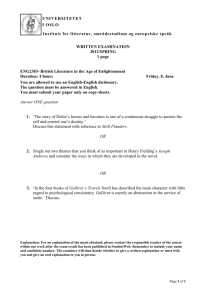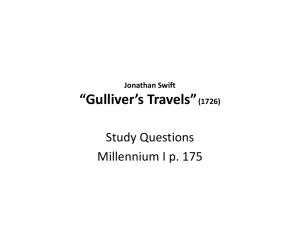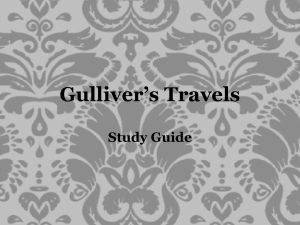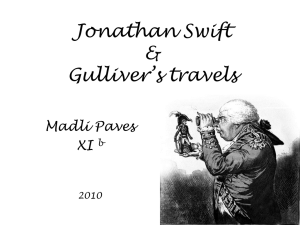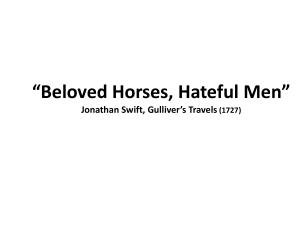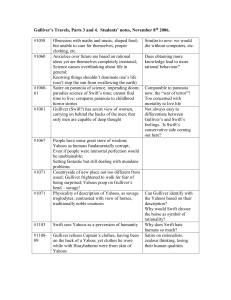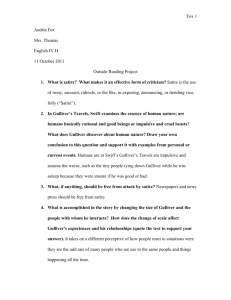Gulliver's Travels Article 5
advertisement
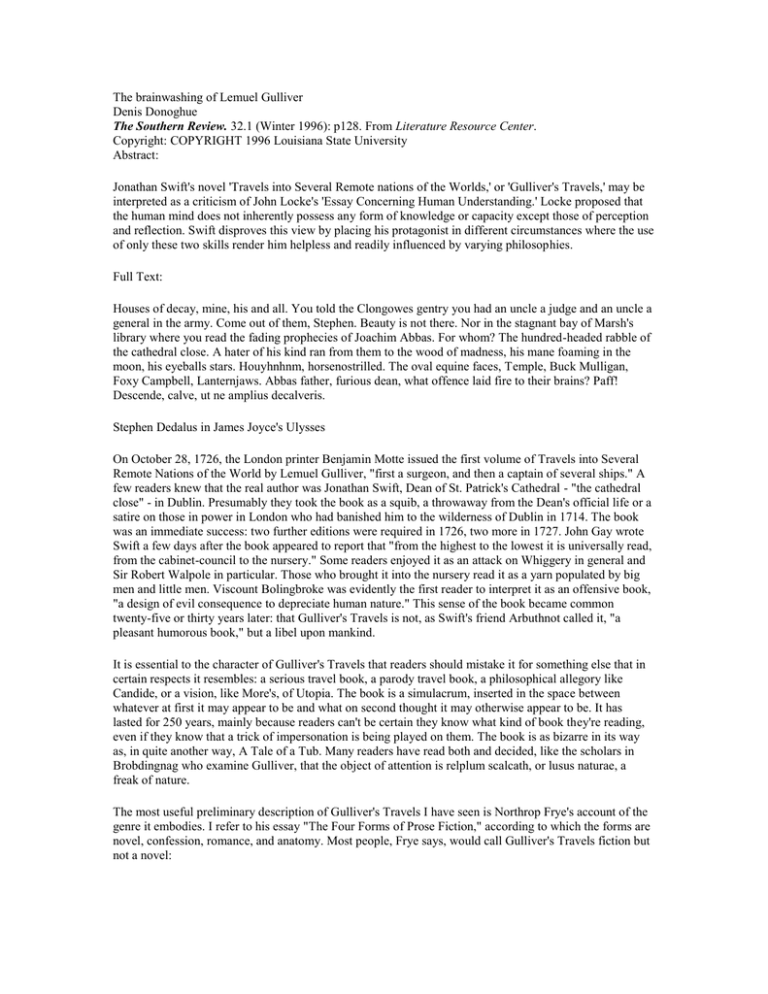
The brainwashing of Lemuel Gulliver Denis Donoghue The Southern Review. 32.1 (Winter 1996): p128. From Literature Resource Center. Copyright: COPYRIGHT 1996 Louisiana State University Abstract: Jonathan Swift's novel 'Travels into Several Remote nations of the Worlds,' or 'Gulliver's Travels,' may be interpreted as a criticism of John Locke's 'Essay Concerning Human Understanding.' Locke proposed that the human mind does not inherently possess any form of knowledge or capacity except those of perception and reflection. Swift disproves this view by placing his protagonist in different circumstances where the use of only these two skills render him helpless and readily influenced by varying philosophies. Full Text: Houses of decay, mine, his and all. You told the Clongowes gentry you had an uncle a judge and an uncle a general in the army. Come out of them, Stephen. Beauty is not there. Nor in the stagnant bay of Marsh's library where you read the fading prophecies of Joachim Abbas. For whom? The hundred-headed rabble of the cathedral close. A hater of his kind ran from them to the wood of madness, his mane foaming in the moon, his eyeballs stars. Houyhnhnm, horsenostrilled. The oval equine faces, Temple, Buck Mulligan, Foxy Campbell, Lanternjaws. Abbas father, furious dean, what offence laid fire to their brains? Paff! Descende, calve, ut ne amplius decalveris. Stephen Dedalus in James Joyce's Ulysses On October 28, 1726, the London printer Benjamin Motte issued the first volume of Travels into Several Remote Nations of the World by Lemuel Gulliver, "first a surgeon, and then a captain of several ships." A few readers knew that the real author was Jonathan Swift, Dean of St. Patrick's Cathedral - "the cathedral close" - in Dublin. Presumably they took the book as a squib, a throwaway from the Dean's official life or a satire on those in power in London who had banished him to the wilderness of Dublin in 1714. The book was an immediate success: two further editions were required in 1726, two more in 1727. John Gay wrote Swift a few days after the book appeared to report that "from the highest to the lowest it is universally read, from the cabinet-council to the nursery." Some readers enjoyed it as an attack on Whiggery in general and Sir Robert Walpole in particular. Those who brought it into the nursery read it as a yarn populated by big men and little men. Viscount Bolingbroke was evidently the first reader to interpret it as an offensive book, "a design of evil consequence to depreciate human nature." This sense of the book became common twenty-five or thirty years later: that Gulliver's Travels is not, as Swift's friend Arbuthnot called it, "a pleasant humorous book," but a libel upon mankind. It is essential to the character of Gulliver's Travels that readers should mistake it for something else that in certain respects it resembles: a serious travel book, a parody travel book, a philosophical allegory like Candide, or a vision, like More's, of Utopia. The book is a simulacrum, inserted in the space between whatever at first it may appear to be and what on second thought it may otherwise appear to be. It has lasted for 250 years, mainly because readers can't be certain they know what kind of book they're reading, even if they know that a trick of impersonation is being played on them. The book is as bizarre in its way as, in quite another way, A Tale of a Tub. Many readers have read both and decided, like the scholars in Brobdingnag who examine Gulliver, that the object of attention is relplum scalcath, or lusus naturae, a freak of nature. The most useful preliminary description of Gulliver's Travels I have seen is Northrop Frye's account of the genre it embodies. I refer to his essay "The Four Forms of Prose Fiction," according to which the forms are novel, confession, romance, and anatomy. Most people, Frye says, would call Gulliver's Travels fiction but not a novel: It must then be another form of fiction, as it certainly has a form, and we feel that we are turning from the novel to this form, whatever it is, when we turn from Rousseau's Emile to Voltaire's Candide, or from Butler's The Way of All Flesh to the Erewhon books, or from Huxley's Point Counterpoint to Brave New World. The form thus has its own traditions, and, as the examples of Butler and Huxley show, has preserved some integrity even under the ascendancy of the novel. Its existence is easy enough to demonstrate, and no one will challenge the statement that the literary ancestry of Gulliver's Travels and Candide runs through Rabelais and Erasmus to Lucian. Gulliver's Travels, then, is an anatomy, as in Robert Burton's Anatomy of Melancholy, where anatomy means dissection or analysis. Frye also called it a Menippean satire, a type of fiction that "deals less with people as such than with mental attitudes" (in which respect it differs from the novel). In the anatomy, "pedants, bigots, cranks, parvenus, virtuosi, enthusiasts, rapacious and incompetent men of all kinds are handled in terms of the 'humor' or ruling passion, their occupational approach to life as distinct from their social behavior." It is a feature of the anatomy that characterization is stylized rather than realistic: people are presented as mouthpieces of the ideas or notions they hold. In an anatomy the chief character is often a pedant, a lunatic of one idea. Reading Gulliver's Travels, one is bemused to find Gulliver continually doing the same thing, getting himself into the same predicament, like Charlie Chaplin or Buster Keaton. A constant theme in the anatomy, Frye remarks, is ridicule of the philosophus gloriosus; Lucian ridicules the Greek philosophers, Rabelais and Erasmus the scholastics, Swift the Cartesians and the Royal Society, Voltaire the Leibnizians, Peacock the Romantics, Samuel Butler the Darwinists, Huxley the behaviorists. The reason for this is that "while the novelist sees evil and folly as social diseases, the Menippean satirist sees them as diseases of the intellect, as a kind of maddened pedantry which the philosophus gloriosus at once symbolizes and defines." The anatomy, finally, "presents us with a vision of the world in terms of a single intellectual pattern." It often achieves this pattern by imposing upon its image of life "a logical and self-consistent shift of perspective, presenting it as Lilliputian or Brobdingnagian," or by telling the story "from the point of view of an ass, a savage, or a drunk." Or else "it will take the form of a 'marvelous journey' and present a caricature of a familiar society as the logical structure of an imaginary one." My reference to A Tale of a Tub allows me to remark that Gulliver's Travels, like the Tale, exhibits instances of irony stable and unstable, to use Wayne Booth's distinction in The Rhetoric of Irony. In stable irony we have only to make one interpretive move and we are back on solid ground. When Gulliver offers to make cannon-guns and explosives for use by the King of Brobdingnag, we have only to make one move to see that Gulliver and the European civilization for which he speaks are being reflected on. But the irony in Gulliver's Travels is often unstable: after one interpretive move we find ourselves still on shifting sands, as in the voyage to the Houyhnhnms. In stable irony there is always an imaginary point from which the world can be viewed in its entirety; in unstable irony there is no such point. Instead there is a sequence of equivocation that we bring to an end only arbitrarily, when we have had as much equivocation as we can bear. Nor is the irony Kierkegaardian, that is, propelled by the ironist's desire to feel free, to enjoy the freedom of having no motive other than that enjoyment. We have no such impression of Gulliver's Travels. Swift's irony in that book is local, opportunistic, and irregular. You may call it negative if, like F. R. Leavis, you construe the book as sustained by no system of values (unlike, say, Pope's Dunciad). If, reading the Tale, you are not happy with the serene and peaceful possession of being well deceived, you may choose to be undeceived, with no greater boon of happiness. It is generally held that the mischief of Gulliver's Travels is postponed till the fourth voyage and Gulliver's encounters with the Houyhnhnms and the Yahoos. In fact, the mischief begins with Swift's presentation of Gulliver himself. When writers of fiction establish first-person narration, they usually give their narrators enough capacity to understand their experiences or the events they witness: not necessarily every capacity, but enough to report on events. Some writers, notably Henry James, can't bear to have their stories told by an idiot, a fool, or a villain. James knew that such people exist, and must be acknowledged in fiction, but he didn't think they should have the responsibility of delivering the main issues or of being the chief personages of the fiction. He wondered about Fielding's procedure in Tom Jones, and only reluctantly came to think it was acceptable: the gist of his acceptance was that while Tom hasn't a brain in his head, Fielding has enough brains for both of them. But in Gulliver's Travels, while Gulliver is neither idiot, fool, nor villain, he is barely qualified to take the force and point of his experience. He is given some competence in navigation and the rudiments of medicine, but he can deal with experience only when it comes in a form he can count or measure. Swift has created in Gulliver one of the most memorable characters in fiction by giving him virtually no character at all, no imagination, no depth of feeling, no resources of inner life beyond the attributes of a hack reporter on a local newspaper. He has no sense of anything beneath the visible surface, no powers of divination, and no inkling of the need for such powers. We generally assume that each of us sees the world from his or her own point of view. It would be distressing if we found that our sense of the world differed fundamentally from everyone else's. We take it for granted that our perceptions don't differ drastically from those of most other people, and we practice the domestic economy of assuming the world is, by and large, as we see it: we make for ourselves a picture, a rudimentary diagram, and we act upon that. When we say Gulliver has no imagination, we also mean that he doesn't feel the lack or the need of it; he is too busy reporting events as if they had only to be reckoned, weighed, and counted. He thrives - or at least gets along - on the penury of his interests. So readers must take an unusually active part in constructing the book. We can't take Gulliver's as the true last word on any subject, though as the first word we feel compelled to rely on it. In matters of judgment, discrimination, the relation between one thing and another, readers have to do most of the work for themselves. Gulliver has merely indicated that there is work to be done; he reports the occasions that call for judgment. Again a contrast with James is appropriate. When we read, say, The Ambassadors, we find that our main task is to keep up with Lambert Strether, rising to his occasions of perception and divination. We have to think and feel with him up and down and all around the town. In the end we may decide that he's not an impeccable interpreter of the events, and that we are justified in trying to go beyond him or think aside from him. But in Gulliver's Travels we start with a conviction that Gulliver's sense of life differs from ours and is palpably inadequate to the reality it negotiates. Swift sends Gulliver voyaging into several remote nations of the world, and he gives him an absurdly meager supply of qualifications. He is allowed to bring along only the attributes normally found adequate in a settled society - a simple frame of reference, modest expectations, and the disposition of a practical man. We begin to suspect that Gulliver is as he is not because God made him so but because England made him so. If there is an English tradition in politics, education, and morality, it is inscribed in him: it discloses itself in a sense of life that settles comfortably upon its constraints and regards as folly and vanity any interests that range beyond a narrow circle. To put the situation in a phrase: Gulliver has been brainwashed to become what he is. England has made him, written a program beyond which he does not stray. His duty coincides with his inclination: to station himself in front of events and report them in direct prose. Someone else, the reader, must act upon the information that Gulliver supplies. The comedy arises from the fact that a mind programmed to observe nothing more than the ordinary daily events in England is found bringing its limited attributes to bear upon situations inordinate and bizarre. Trained to observe certain constituents of experience, Gulliver's mind has never been instructed in the art of dealing with monsters. When I say that England made Lemuel Gulliver, I mean to disagree with Terry Eagleton's claim, in Heathcliff and the Great Hunger, that Gulliver's Travels is about Ireland. According to Eagleton, Gulliver is "an appropriate figure for an Ascendancy which was both colonized and colonialist." I can't read the book that way. Its subject seems to me the susceptibility of the human mind to the experience it happens to undergo; Gulliver's Travels denotes the conditions, mostly demeaning, under which the mind somehow manages to persist. Samuel Johnson said of the book: "When once you have thought of big men and little men, it is very easy to do all the rest." It's not at all easy. Or rather: that isn't what's going on. Swift's real achievement is to attract into the orbit of big men and little men a mind somehow capable of surviving experience without understanding it. In the end, Swift darkens the comedy by showing the same mind succumbing to its experience and nearly dying in the event. In the first three voyages, the humor is fairly simple: it is the comedy of disproportion, which arises from the differences between ends and means, essence and existence, absolutes and relativities, big men and little men, Big Enders and Little Enders, steady states and floating islands. There is little evidence of Gulliver's being brainwashed in Lilliput; for good reason, because he is a giant among these tiny people. It is part of the rhetoric of the book that one is to be impressed by big people and to despise little people. Whenever such words as "little" and "diminutive" appear, they arouse contempt for the people to whom they refer. But in one respect the brainwashing begins in Lilliput: Gulliver adopts the grandiloquent style of address so prevalent there. When he prevents war between Lilliput and Blefuscu by pulling the ships out of the Blefuscu harbor, he addresses the ruler of Lilliput in a loud voice: "Long live the most puissant Emperor of Lilliput!" When he is leaving, and the emperor and his family come out to say good-bye, Gulliver reports that "I lay on the Ground to kiss his Majesty's and the Empress's hand." But the rhythm of brainwashing gets started in the second voyage: appropriately, because Gulliver is now the diminutive one. When the King of Brobdingnag has listened for a while to Gulliver's account of life in England, he "observed, how contemptible a Thing was human Grandeur, which could be mimicked by such diminutive insects as I." Gulliver is inclined to take offense, but on second thought not: But, as I was not in a Condition to resent injuries, so, upon mature Thoughts, I began to doubt whether I were injured or no. For, after having been accustomed several Months to the Sight and Converse of this People, and observed every Object upon which I cast mine Eyes, to be of proportionable Magnitude; the Horror I had first conceived from their Bulk and Aspect was so far worn off, that if I had then beheld a Company of English Lords and Ladies in their Finery and Birth-day Cloaths, acting their several Parts in the most courtly Manner of Strutting, and Bowing and Prating; to say the Truth, I should have been strongly tempted to laugh as much at them as this King and his Grandees did at me. Neither indeed could I forbear smiling at my self, when the Queen used to place me upon her Hand towards a Looking-Glass, by which both our Persons appeared before me in full View together; and there could nothing be more ridiculous than the Comparison: So that I really began to imagine my self dwindled many Degrees below my usual Size. Gulliver is not in a position to resent injuries, so he becomes accustomed to not resenting them. Behaviorism is at work. He starts doubting whether he has cause of resentment. He has begun - as Hermia says in A Midsummer Night's Dream - to "choose love by another's eyes." The queen's eyes, for the time being. She keeps a dwarf for her amusement: Nothing angred and mortified me so much as the Queen's Dwarf, who being of the lowest Stature that was ever in that Country, (for I verily think he was not full Thirty Foot high) became so insolent at seeing a Creature so much beneath him, that he would always affect to swagger and look big as he passed by me in the Queen's Antichamber, while I was standing on some Table talking with the Lords or Ladies of the Court; and he seldom failed of a smart Word or two upon my Littleness; against which I could only revenge my self by calling him Brother, challenging him to wrestle; and such Repartees as are usual in the Mouths of Court Pages. One Day at Dinner, this malicious little Cubb was so nettled with something I had said to him, that raising himself upon the Frame of her Majesty's Chair, he took me up by the Middle, as I was sitting down, not thinking any Harm, and let me drop into a large Silver Bowl of Cream; and then ran away as fast as he could. Here the ironies persist, but virtually every phrase sends them off in a different direction. Choosing derision by another's eyes, Gulliver affects to despise the dwarf - "of the lowest Stature that was ever in that Country." But the idiom he uses is the "repartee" of court pages: "affect to swagger and look big." Gulliver hardly glances at his own posture - "while I was standing on some Table talking with the Lords or Ladies of the Court" - the word "some" enhancing the sense of inattention. The malice of "this malicious little Cubb" is already prepared for by the force of "dwindled," "diminished," and other such words in earlier passages. The full effect is realized by associating the affected dwarf with the English ladies in their strutting, bowing, and prating. Forty pages later, when Gulliver has left Brobdingnag and is rescued by the ship, he tells the captain that when he first saw the sailors, he thought them "the most little contemptible Creatures I had ever be-held": "For, indeed, while I was in that Prince's Country, I could never endure to look in a Glass after my Eyes had been accustomed to such prodigious Objects; because the Comparison gave me so despicable a Conceit of my self." In Brobdingnag, Gulliver accepts the local system of values so readily that when he goes to see the chief temple, the tower reckoned "the highest in the Kingdom," he comes back disappointed: it is hardly more than three thousand feet high. But the most thorough brainwashing takes place in the fourth voyage. Gulliver sees the Yahoos and thinks them hideous brutes; he is still an Englishman. But after a while he comes to see himself as very like a Yahoo, different only because he wears clothes; they run about naked. The apprehension of resemblance makes him loathe the Yahoos even more, presumably because it forces him to see his own nature in a hideous form. When he meets the whinnying horses, he finds them impressively reasonable, and they think him a Yahoo, though notably teachable for such a brute. However, the Houyhnhnms soon decide that while Gulliver's learning ability is good for a Yahoo, and while his personal habits are cleaner than one would expect, in every other respect he is inferior to the rest of his kind. Gulliver doesn't defend himself against these comparisons: gradually, he is brainwashed enough to find them convincing. Chapter Seven begins: The Reader may be disposed to wonder how I could prevail on my self to give so free a Representation of my own Species, among a Race of Mortals who were already too apt to conceive the vilest Opinion of Human Kind, from that entire Congruity betwixt me and their Yahoos. But I must freely confess, that the many Virtues of those excellent Quadrupeds placed in opposite View to human Corruptions, had so far opened mine Eyes, and enlarged my Understanding, that I began to view the Actions and Passions of Man in a very different Light; and to think the Honour of my own Kind not worth managing; which, besides, it was impossible for me to do before a Person of so acute a Judgment as my Master, who daily convinced me of a thousand Faults in my self, whereof I had not the least Perception before, and which with us would never be numbered even among human Infirmities. I had likewise learned from his Example an utter Detestation of all Falsehood or Disguise; and Truth appeared so amiable to me, that I determined upon sacrificing every thing to it. Gulliver comes to accept the Houyhnhnm view of things, at whatever cost to his self-esteem. He agrees, for instance, that a being whose eyes are placed directly in front, one on each side of his nose and each directed forward, can't look far on either side without turning his head: a disability from which your true Yahoo is exempt. Gulliver admits the point of these comparisons. A mind already brainwashed by the England that made him is ready to be brainwashed again by his new masters, the Houyhnhnms. Appropriately, the first sign of this process is that Gulliver comes to think the English language "barbarous" by comparison with the language of the Houyhnhnms. The Houyhnhnms don't accept Gulliver as a rational animal; rather, they speak of "those appearances of reason" in him, and decide that instead of being a rational creature he has merely been taught to imitate one: He added, how I had endeavoured to persuade him, that in my own and other Countries the Yahoos acted as the governing, rational Animal, and held the Houyhnhnms in Servitude: That, he observed in me all the Qualities of a Yahoo, only a little more civilized by some Tincture of Reason; which however was in a Degree as far inferior to the Houyhnhnm Race, as the Yahoos of their Country were to me. When a further comparison arises between Gulliver and the Yahoos, the Houyhnhnms conclude that the comparison works against him. After Gulliver has given his master a full account of human life in England, his master says that "when a Creature pretending to Reason could be capable of such Enormities, he dreaded, lest the Corruption of that Faculty might be worse than Brutality itself." He seemed therefore confident, Gulliver reports, "that instead of Reason, we were only possessed of some Quality fitted to increase our natural Vices." When a young female Yahoo attempts a sexual assault on the naked Gulliver, he has to accept the obvious conclusion: "For now I could no longer deny, that I was a real Yahoo, in every Limb and Feature, since the Females had a natural Propensity to me as one of their own Species." A few pages later Gulliver thinks to himself: "For, supposing I should escape with Life by some strange Adventure, how could I think with Temper, of passing my Days among Yahoos, and relapsing into my old Corruptions, for want of Examples to lead and keep me within the Paths of Virtue." Before he has spent a year with the Houyhnhnms, he has contracted, he says, "such a Love and Veneration for the Inhabitants, that I entered on a firm Resolution never to return to human Kind, but to pass the rest of my Life among these admirable Houyhnhnms in the Contemplation and Practice of every Virtue; where I could have no Example or Incitement to Vice." After a while, Gulliver comes to think it wonderful that these whinnying horses would condescend to distinguish him from the rest of his species, the Yahoos, and he can't bear to look at the reflection of his body in a lake. He begins to imitate the trotting of the horses and to speak in a whinnying voice. Compelled to leave the country of the Houyhnhnms, he prostrates himself to kiss his master's foot, and thinks it wonderful that his master does him the honour of raising the hoof to his mouth. When it looks as if he will be rescued by a passing ship, Gulliver sails off in another direction, choosing, as he says, to live with barbarians rather than with European Yahoos. When he is befriended by the Portuguese Captain Don Pedro de Mendez, Gulliver concludes that he should descend to treat him "like an Animal which had some little Portion of Reason." Brought to Lisbon, Gulliver can walk the street only if his nose is "well stopped with Rue, or sometimes with Tobacco." When the captain offers to give him his best suit of clothes, Gulliver declines the offer, "abhorring to cover myself with any thing that had been on the Back of a Yahoo": "I only desired he would lend me two clean Shirts, which having been washed since he wore them, I believed would not so much defile me. These I changed every second Day, and washed them myself." Restored to his home, Gulliver finds himself loathing the sight of his family: My Wife and Family received me with great Surprize and Joy, because they concluded me certainly dead; but I must freely confess, the Sight of them filled me only with Hatred, Disgust and Contempt; and the more, by reflecting on the near Alliance I had to them. For, although since my unfortunate Exile from the Houyhnhnm Country, I had compelled myself to tolerate the Sight of Yahoos, and to converse with Don Pedro de Mendez; yet my Memory and Imaginations were perpetually filled with the Virtues and Ideas of those exalted Houyhnhnms. And when I began to consider, that by copulating with one of the YahooSpecies, I had become a Parent of more, it struck me with the utmost Shame, Confusion and Horror. As soon as Gulliver entered his home, he reports, "my Wife took me in her Arms, and kissed me; at which, having not been used to the Touch of that odious Animal for so many Years, I fell in a Swoon for almost an Hour." His favorite company in England is that of two horses and their groom, "for I feel my Spirits revived by the Smell he contracts in the Stable." Gradually, the effects wear off: the next phase of brainwashing begins. By the end of the book, Gulliver is becoming an Englishman again, though he will remain for a long time incensed by his countrymen's vanity and pride: "And although it be hard for a Man late in Life to remove old Habits, I am not altogether out of Hopes in some Time to suffer a Neighbour Yahoo in my Company, without the Apprehensions I am yet under of his Teeth or his Claws." There are two overlapping contexts in which brainwashing in Gulliver's Travels may be considered. So far as the violence is directed against someone's mind, the first context is epistemological, and the philosophy referred to in all but words is Locke's. I agree with those who hold that Swift had little or no interest in philosophy, and that the third voyage shows how ready he was to make fun of intellectual pursuits. Quite so. But he was interested in religion and in politics, and he liked to think he knew what he was saying in sermons and pamphlets. He needed to have some notion of knowledge: that is all I am concerned to assume. I would be surprised to find him speculating, beyond local need, on the character of a sense-datum. In the Essay Concerning Human Understanding, Locke argues that the mind, to begin with, is a blank page waiting to be written upon, a tabula rasa. The first stage in the mind's development is a sensory event: adverting to an external object or action, the mind responds with certain sensations. The only other capacity the mind has is that of reflecting upon those sensations and, finally, upon its own processes. Every word of what I have just said would need to be explicated if I were a professional philosopher, or if Swift were; no such necessity arises now. My few rudimentary sentences indicate what Locke regarded as the basic materials of knowledge, and why in their possession the mind has no choice. "In this Part," Locke writes, "the understanding is meerly passive; and whether or no, it will have these Beginnings, and as it were materials of Knowledge, is not in its own Power." Against Descartes, Cudworth, and many others, Locke insists that there are no "innate notions," as he calls them in the first book of the Essay. He maintains that if there were innate notions, an infant would be born with the idea of God and the conviction that God is to be worshipped. From the child's lack of such an inborn faith, innate ideas do not exist. Not that Locke's position on that matter was decisive. Leibniz attacked it, for instance, on the ground that it is impossible to construct knowledge from zero - the tabula rasa - and the exterior world. Contingent understanding, Leibniz argued, never builds from zero. Locke's "savage," the figure he posited as the zero point of knowledge, is not (in Leibniz's view) a mere form waiting to be written on, but rather a figure of decadence: savages are not primitives but men who have forgotten the primitive. I should note, however, that the main reason for Locke's opposition to innate ideas was political or civic rather than epistemological: he saw that those who believed in innate ideas also claimed the right to say what those ideas were and to impose them upon others. Nor is it a small power it gives one Man over another, to have the Authority to be the Dictator of Principles, and Teacher of unquestionable Truths; and to make a Man swallow that for an innate Principle, which may serve to his purpose, who teacheth them. It was for political reasons, therefore, that Locke attacked the assumption that there are innate ideas. Toleration was more important to him than any other consideration. In the Letter to a Young Clergyman, some scholars have found Swift criticizing Locke for his stand against inborn principles. The criticism seems to me clearer in the sermon "On the Testimony of Conscience," where Swift defines conscience as "that Knowledge which a Man hath within himself of his own Thoughts and Actions." God, he says, "hath placed Conscience in us to be our Director only in those Actions which Scripture and Reason plainly tell us to be good or evil." Clearly if God placed conscience in us, it is innate. But nothing in Locke's account of sensation and reflection allows for such a moral sense. In Swift's view the denial of conscience as an innate power would undermine religion. Locke refused to give credence to innate ideas, but he had no hesitation in saying that there are capacities indigenous to humankind: specifically the powers of sensory perception and of reflection. These would assure that you could act in certain ways, but they wouldn't compel you to act in any particular way. Nor would they establish a moral propensity. But Locke recognized an acute problem in the chapter on the "Association of Ideas." His aim was to take the control of our thinking away from passion or any extrinsic authority and to allow us to think for ourselves and take responsibility for our actions. We are to step aside from our spontaneous interests and try to understand our processes of thinking. The mind, according to Locke, has "a power to suspend the execution of any of its desires; and so all, one after another; is at liberty to consider the objects of them, examine them on all sides, and weigh them with others." So Locke included in the power of reflection what we normally call "will." In that respect one's thinking should be a declaration of independence. But in the "Association of Ideas" chapter he meets the difficulty of distinguishing between associations that form customs - which are good - and those that form habits which are bad. He refers at one point to "the Empire of Habit." Clearly, Locke thinks associations of ideas that set up habits are the very definition of madness; for one thing, they veto the act of reflection by preventing the mind from feeling inclined to it. Hans Aarsleff has noted, in From Locke to Saussure, that Locke didn't work out this problem; he left to Condillac's Essay on the Origin of Human Knowledge (1746) the development of the premise that the association of ideas was innate, or might be. My contention, then, is that one of the aims of Gulliver's Travels is to make dark fun of Locke's epistemology: to show how vulnerable the mind is if it has no capacities but those of sensation and reflection, if its life begins with external events and objects and depends entirely upon them. Gulliver is a parody of Locke's empiricism, an epistemology that assumes the mind is a faculty capable of two and only two acts - perception and reflection. In the extreme version of empiricism called naturalism, the mind is the slave of its contents. That is what Yeats had in view, I assume, when he wrote Locke sank into a swoon, The garden died, God took the spinning jenny Out of his side. The swoon is passivity: the mind, in Locke's account of it, depends upon the contingency of its sensations. Yeats thought that Pound and Joyce capitulated to this wretched assumption. Swift feared that Locke might be right, and he dealt with his fear by parodying it. Assume Locke is right: then if you change the things a mind encounters, you change the mind. This is brainwashing, in effect. Swift is demonstrating in Gulliver what Locke's empire of habit comes to, formed by enforced associations of ideas. Such an imperial force thwarts the act of reflection, upon which Locke's philosophy relies. Swift's position is like the one La Fontaine ironically embodied in the fable of the wolf and the lamb: "The reason of the Stronger is always the best." The second context also involves Locke, but this time the issue is moral philosophy rather than epistemology. Charles Taylor has outlined the situation very clearly in his Sources of the Self (1989), so I will do little more than give the gist of the dispute in his terms. In Swift's time there were two relevant traditions in moral and political philosophy. One was represented by Hobbes and Locke: it expressed a naturalistic transposition of the doctrine of original sin. According to this tradition, God's law is doubly external to us as fallen creatures: first, because we cannot identify the good with the bent of our own natures; and second, because the law of God - if we could discover what it is - runs against the grain of our depraved wills. We cannot, therefore, deduce a morality from the natural world, so we are well advised to regard nature as neutral. All we can do is be as self-aware as possible and act responsibly under the auspices of tolerance. The other tradition of moral philosophy is represented by the Cambridge Platonists - especially Henry More, Ralph Cudworth, Benjamin Whichcote, and John Smith. They saw human beings as intrinsically attuned to God, and hence spoke freely of our "inward Nature," according to which we are in harmony with the nature of the universe. This philosophy of benevolence was clear enough in Bolingbroke and Pope, but it was most fully articulated by Shaftesbury and by Francis Hutcheson. "I must love whatever happens," Shaftesbury says in his Philosophic Regimen, "and see it all as fitted to me and orderly with respect to the whole, even 'the sack of cities and the ruin of mankind.'" Where Locke found the source of morality in the dignity of a disengaged subject confronting a neutral nature, Shaftesbury ascribed it to the benevolent soul participating in the harmony of the universe. His crucial phrase is "natural affection," by which he means the sentiment that prompts us to love the whole world and everyone in it. Taylor refers to Shaftesbury's internalization of a teleological ethic of nature, and to his transformation of the appearances of harmony, order, and equilibrium into an ethic of benevolence. Hutcheson developed this moral philosophy further in his Inquiry into the Original of Our Ideas of Beauty and Virtue. Clearly he had Locke in his sights, and he undertook to attack the assumption, common to Hobbes, Locke, and La Rochefoucauld, that the distinction between good and bad is founded upon self-love, self-interest, and nothing else. Hutcheson's first act in this dispute is to posit in each of us a moral sense. "Some actions have to men an immediate goodness," he says, and by immediate he means innately delivered, not the result of reflection and training. Taylor notes that this is a risky assumption, especially as Hutcheson acknowledges that God could have given us a wholly different moral sense, or none at all. The fact that God gave us the particular moral sense we have is one of Hutcheson's proofs of His benign providence, but he doesn't see that he has opened the door wide to relativism. It is hard to claim at once that our moral sense is primordially given by God, and that God in His absolute freedom could have made a different choice. In his Essay on the Nature and Conduct of the Passions and Affections, Hutcheson renews his attack on Locke and the skeptical or misanthropic tradition in moral philosophy. Some people, he says, might think the passions "too subtile for common Apprehension, and consequently not necessary for the instruction of Men in Morals, which are the common business of Mankind." But in fact certain notions about the passions are already current "to the great Detriment of many a Natural Temper; since many have been discourag'd from all Attempts of cultivating kind generous Affections in themselves, by a previous Notion that there are no such Affections in Nature, and that all Pretence to them was only Dissimulation, Affectation, or at best some unnatural Enthusiasm." On the question of moral philosophy - but not of epistemology - Swift is of Locke's party, except that he gives far greater allowance to revelation and conscience than Locke did. His general sense of human life in its moral bearing puts him with Hobbes, Mandeville, and La Rochefoucauld in his belief that moral and social life are mainly propelled by self-love. The only mitigations of this dark vision that Swift is willing to concede are religion and the plain decencies of friendship and common sense. His religion was that of the Church of Ireland, un-exactingly interpreted; but it was not merely a matter of morals. Faith was crucial, though Swift gave a rather prosaic account of it and cheerfully set aside the hard theological mysteries. "By God's great mercy," he said with evident relief, "those difficult Points [of Divinity] are never of absolute necessity to our salvation." Swift thought the Christianity of Anglicanism a good enough basis for personal and social life, but he was not theologically insistent beyond the basic articles of faith and practice. As for the decencies: his moral philosophy was mostly negative and pessimistic, but he allowed for exceptional instances of merit. Taylor says of Locke that in his philosophy we take our place in the order of nature and society through the exercise of disengaged reason. As I have suggested, Swift thought this a risky position to adopt, because the mind is appallingly susceptible to what it happens to encounter. But I think Swift's relation to the tradition of benevolence, as in Shaftesbury and Hutcheson, was severe if not dismissive: it is clear from his presentation of the Houyhnhnms, who live as if every virtue were innate, a practice that enchants Gulliver, though it hardly adds up to life at all. Was it F. R. Leavis who said that if the Houyhnhnms have all the virtue, the Yahoos have all the life? I have said that brainwashing embodies the belief that "the reason of the Stronger is always the best." The Oxford English Dictionary defines brainwashing as "the systematic and often forcible elimination from a person's mind of all established ideas, especially political ideas, so that another set may take their place." The earliest recorded use of the word dates from 1950, early in the "Cold War," a time we associate with the trial of Cardinal Stepinac and the publication of Richard Condon's novel of brainwashing, The Manchurian Candidate (1959). More recently we have seen the case of Patty Hearst, which featured brainwashing (at least in its early stages). The great dictionary also says that brainwashing is "a kind of coercive conversion practised by certain totalitarian states on political dissidents." But the degree of coercion required in each case depends upon the degree of resistance offered. The U-2 pilot Gary Powers didn't offer as much as Cardinal Stepinac. Gulliver offers little or no resistance. Nothing about him is more revealing than his willingness to have his brain washed by new masters. If the book appeals to our sense of humor and to our sense of discrepancy and disproportion, it touches us also in our sense of imprisonment - not necessarily imprisonment in a concentration camp, but in any imposed system of ideas and values. In those conditions the enforced system becomes our second nature and determines our fate. In his book on Proust, Beckett says that habit has this effect; it becomes our second nature and prevents us from seeing our first. Any system can become our prison: a tradition we have inherited, a style we have adopted, an official terminology that tells us what to think. These days we often refer to it as ideology, a system of enforced assumptions within which most things go "without saying" by appearing to "stand to reason." Gulliver's Travels is only superficially about big men and little men: it is really about entrapment; and the most disturbing episode in the book deals with the struldbruggs, those people in Luggnagg who are immortal in the appalling sense that they get older and older but can't die. That is: they can't leave the system. Nor can Gulliver, until circumstances allow him to escape. As long as he is inside the system, he doesn't bring any irony to bear upon it. Irony is the counterforce to brainwashing: it brings to bear upon a given system values antithetical to those in place; it holds out against the system's blandishments. Gulliver doesn't. That is shown with particular clarity in a passage in the fourth voyage where he describes the certitude of reasoning among the Houyhnhnms: As these noble Houyhnhnms are endowed by Nature with a general Disposition to all Virtues, and have no Conceptions or Ideas of what is evil in a rational Creature; so their grand Maxim is, to cultivate Reason, and to be wholly governed by it. Neither is Reason among them a Point problematical as with us, where Men can argue with Plausibility on both Sides of a Question; but strikes you with immediate Conviction; as it must needs do where it is not mingled, obscured, or discoloured by Passion and Interest. I remember it was with extreme Difficulty that I could bring my Master to understand the Meaning of the word Opinion, or how a Point could be disputable; because Reason taught us to affirm or deny only where we are certain; and beyond our Knowledge we cannot do either. So that Controversies, Wranglings, Disputes, and Positiveness in false or dubious Propositions, are Evils unknown among the Houyhnhnms. It may be said that the irony here is turned upon the Houyhnhnms, who have such a boring life of certitude that there is nothing to be discussed or questioned. But the sentence about "Controversies, Wranglings, Disputes, and Positiveness" doesn't offer a value to be set against the blankness of intellectual and moral life among the Houyhnhnms. Swift's hatred of such faction-fighting is clear. Gulliver can't stand apart from his local experience to the extent of imagining what the proper form of reasoning might be. Swift appears to be saying that if you send the human mind into the world without the benefit of revelation, religious belief, and an innate conscience, it will succumb to every authority it meets. There is a passage in Andrei Sinyavsky's A Voice from the Chorus in which the Russian writer, imprisoned in Lefortovo in 1966, recalls certain books he read as a child, among them Gulliver's Travels. Sinyavsky makes the point that Gulliver is well fitted to represent mankind in general, precisely because he has no personality, no permanent qualities: everything depends upon the circumstances in which he is placed. As Sinyavsky has it: "[H]e is short or tall, clean or unclean only by comparison; he is a man by comparison and a non-man by comparison. He is a giant among Lilliputians, a Lilliputian among giants, an animal among the houyhnhnms, a horse among men." Sinyavsky thinks Swift is saying that man is a fiction, a sham. But there is another way of phrasing the conclusion. Man is a function of his environment, trapped in a structure that determines him so long as it holds him there. The only escape is into another structure, where the brainwashing begins all over again, but this time according to a different, though equally arbitrary, set of ideas and principles. The grim comedy of Gulliver's Travels arises from the discrepancy between our vaguely acquired sense of what it means to be human and our more pressing fear that "being human" depends - more than we are to realize - upon favorable local circumstances. When circumstances change, being human is the last thing we can be assured of being. Gulliver's Travels has become a dauntingly "modern" book again in the past thirty or forty years because it presents as fiction what many people are worried about as fact. These worries are provided by ideas of mind and society. Marx said that "social existence determines consciousness," but he allowed for a dynamic relation between mind and environment. One of the major axioms of structuralism went far beyond Marx to say that we are determined by the codes we have been given. We don't hear much of structuralism these days, but none of its successors has claimed that the human mind is in any respect autonomous. It is now regularly assumed that reality and knowledge are socially constructed and that sociologists of knowledge are equipped to understand the processes of this construction. In The Social Construction of Reality (1966), Peter L. Berger and Thomas Luckmann define "reality" as "a quality appertaining to phenomena that we recognize as having a being independent of our own volition (we cannot 'wish them away')"; and they define "knowledge" as "the certainty that phenomena are real and that they possess specific characteristics." This is old-style positivism translated into sociology: it allows no place for metaphysical, religious, or visionary values. More to the point, it hands over to "society," by which Berger and Luckmann appear to mean the accredited institutions that happen to be in place at this moment, the right to decide what constitutes knowledge in any particular. I don't see how this sociology of knowledge differs from the brainwashing I've been describing in Gulliver's Travels. Gulliver's Travels touches upon another issue, close to the one I've just described but perhaps distinguishable from it because it adverts to the possibility that man may not be the son of God but identical with something he resembles - an artifact, a machine, a gadget made like any other to perform a few simple operations. Hugh Kenner has examined this motif in The Counterfeiters, which he subtitles An Historical Comedy, presumably because one source of comedy, according to Bergson, is a sense of discrepancy between axioms of life as organism and appearances of life as gadgetry. The optimistic answer to this sense of discrepancy is the assertion that if man is a machine, he is a machine with a difference, and that this difference makes all the difference. We say, for instance, that man is an animal with the further distinguishing power of reason or symbolic action: he can reflect upon his experience and represent it in symbolic terms. If we think the difference exhilarating, we conclude that man's perfection in his kind enables him to transcend his kind: he is not a mere animal at all. This optimism depends upon our emphasizing in man's favor a spiritual dimension, a particular quality or aura, that makes men and women what they are. Gulliver's Travels incites us to think or to fear that this optimism is false, that the x-factor is a delusion, merely yet another manifestation of pride. Hazlitt said that Swift took a new view of human nature, "such as a being of a higher sphere might take of it." Precisely: because it is a matter of perspective. Swift presents in Gulliver a man bereft of spiritual radiance; he is merely the sum of his attributes, and these are few. He is someone to whom certain things happen. This is Swift's main satiric device: to present every ostensibly spiritual quality in a material form, reducing qualities to quantities. And if an optimistic reader declares that man is more than the sum of a few attributes, Swift accepts the challenge. We can almost hear him say, "Prove it." In the end, Gulliver is restored to himself. But what is the self to which he is restored? Is it that of the trueborn Englishman, the ideologically propelled figure projected after the Restoration and the Glorious Revolution by an England desperately anxious to avoid another civil war and the execution of another king? Something like that. Gulliver is an empiricist without memory or the need of it, a man restored to sanity who does not know that he has been mad. He is as close as possible to being "a man without qualities." Among DENIS DONOGHUE's books are Walter Pater: Lover of Strange Souls (Knopf, 1995) and The Old Moderns: New Essays on Literature and Theory (Knopf, 1994). Source Citation (MLA 7th Edition) Donoghue, Denis. "The brainwashing of Lemuel Gulliver." The Southern Review 32.1 (1996): 128+. Literature Resource Center. Web. 20 Apr. 2016. URL http://ezproxy.fhda.edu:2128/ps/i.do?id=GALE%7CA18160183&v=2.1&u=ccl_deanza&it=r&p=LitRC&s w=w&asid=0647a2cc991c27d4d23f248a4df174b1 Gale Document Number: GALE|A18160183
